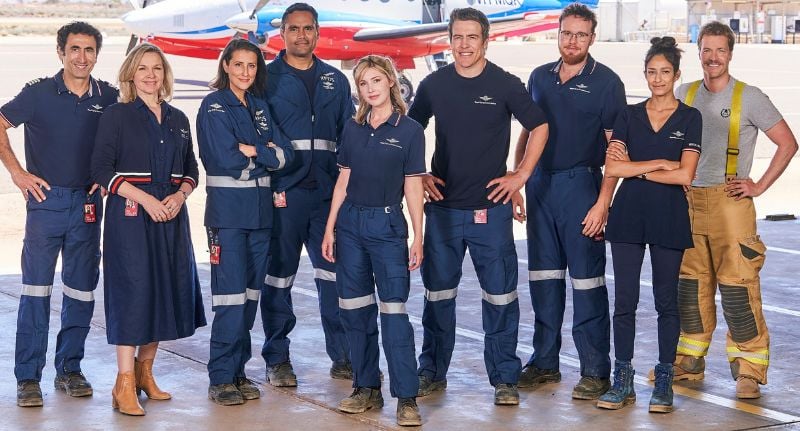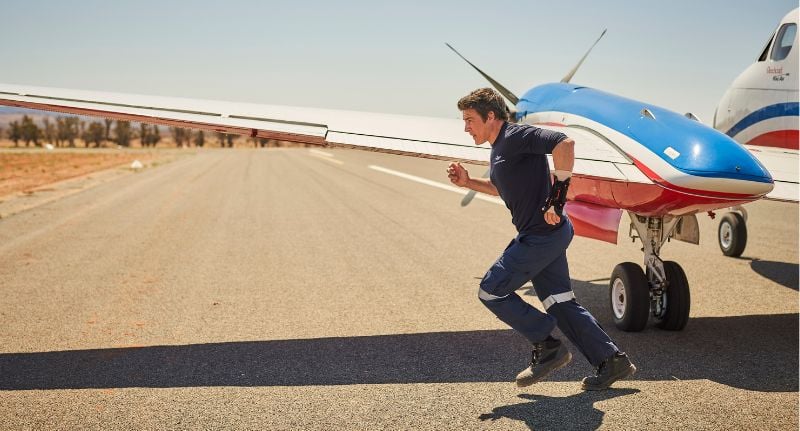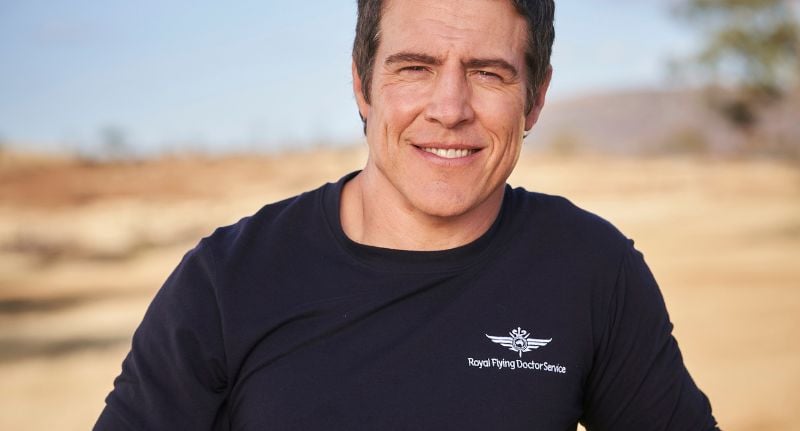Australia’s award-winning outback drama RFDS returns to Seven and 7plus this October for its third season, continuing its mix of high-stakes emergencies and grounded storytelling about the Royal Flying Doctor Service (RFDS).
The show, which won the 2024 TV WEEK Logie Award for Best Drama Program, will pick up a year after the season two finale, with the Broken Hill crew dealing with the fallout from a mass-casualty bus crash.
For star Stephen Peacocke, the series is more than just another acting credit. Growing up in Dubbo, and later working as a jackaroo in remote New South Wales, he recognised his own experiences in the scripts from the moment he auditioned.
“From day dot, I remember this is one of the first jobs I’d actually been offered,” Peacocke told Mediaweek. “The minute I read it I recognised how well written these characters were.”
That sense of accuracy was a big part of the appeal. “I remember just calling my agent and saying, gosh, this is bang on. These are the people I know and it’s written so accurately.”
Peacocke is particularly proud of how the show avoids clichés that often dominate depictions of country life.
“Growing up in regional Australia, there aren’t a whole heap of shows about these people and when those shows do pop up they seem to be playing into these clichés. The station I worked on was worth tens of millions of dollars. There’s a lot at stake and they’re all people who have been to university in Sydney or wherever and gone home to run those big businesses,” he explains.
“It’s a different world and sometimes it’s not portrayed that way. So I was really excited to play something like this that I could see from the page and from the outset was accurate.”
The connection for him is also personal. “My mum’s been selling tickets to the Royal Flying Doctors with her friends for years and years, and when I jackored at that place, there was always a medical check there from the RFDS in case anything went wrong,” he says. “Australia doesn’t survive without the Outback and the Outback doesn’t survive without the RFDS. So it’s a big responsibility, but I love playing the role.”

RFDS cast
A season shaped by crisis
Season three opens with a mass-casualty bus crash, an event Peacocke describes as both confronting and pivotal.
“When you read about it the way we did and then you’re in there and the makeup, you know, the special effects is done and everyone looks terrible, it’s confronting,” he says.
What struck him most, though, was the realism of the decisions portrayed. “But the most interesting thing is the choices that these first responders are going to make because they’re going to turn up to a place like this, and triage the whole thing, they’re following an algorithm that’s in their head.”
Peacock also revealed the episode acts as something as a catalyst, with repercussions and reverberations felt through the next eight episodes.
To ensure realism, RFDS staff were on set during filming. “What they can do under the most extreme situations is extraordinary,” Peacocke explains.
“They’ve got this skill set. They turn up when people are experience their worst possible day and it’s just incredible how they operate,” he admired.
The craft of realism
Peacocke credits the writing and production team for creating an environment where actors can simply respond to what’s in front of them. “When the writing’s that good, it’s easy,” he says.
“We’re shooting outside of Adelaide on this remote bit of road and there’s a bus turned over and there’s bloody people everywhere with blood all over them. It doesn’t take long to get lost in everything that’s been set up for you and then it’s just a matter of doing what these people do in that situation.”
That realism carries an emotional toll, with Peacocke admiting the first episode of the new season pushed him to his emotional limits. As he recalls the final scene, his voice catches: “There is a moment at the end of the first episode where… oh, gosh, mate, you’re making me sad now,” he said with a half-laugh, brushing off the emotion.
The day had been long and heavy. “We were all heart-wrenching and we’d done a bloody 12-hour day by the time we got to that point in the night and you’re pretty worn out and you kind of just go with it. When the writing’s that good and acting and directing and everything sort of clicks into gear, it’s pretty thrilling to be a part of.”

Peacocke in a still from the show
Recognition and audience connection
RFDS has won recognition from the industry, but Peacocke says what matters most is the audience.
“We were surprised, in a way, to win that Best Drama Logie last year because it was such stiff competition. But we’ve got this audience that loves it and it’s popular overseas,” he said.
For Peacocke, the show’s success ultimately comes down to the people watching it: “What we do is all about the audience. If you can find an audience and make them happy, then that’s your sole job, I reckon.”
A grounded drama with broad appeal
For Seven, the return of RFDS adds to its slate of local drama that balances mass appeal with international reach. The decision to film in South Australia – using Adelaide, the Flinders Ranges, and Port Augusta as stand-ins for Broken Hill – reflects both logistical upgrades and a push to showcase diverse Australian landscapes.
As Peacocke sums it up: “The way Australians can deal with whatever comes their way, you know, in the bush and in those remote places is really unique and I think that’s what our show gets right.”
